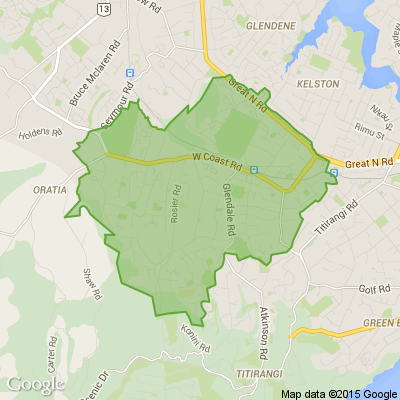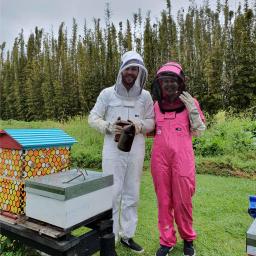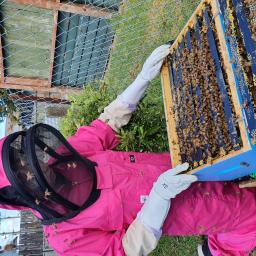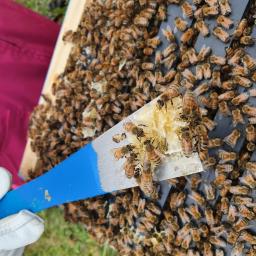Creating a buzz: Glendene, Auckland
Ellen Parker admits she used to shun insects.
But now she is the confident custodian of thousands of bees.
"Normally I'm not really a fan of insects and flying things," said Parker, a medical receptionist.
"But when I started to learn more, I realised they're not out to sting you. They're out there doing their own thing and they're pretty tame."
The Glendene resident and partner Alexander Jones have drawn a flock of followers to their Instagram page @verygoodbeeco, which documents their beekeeping journey.
The 28-year-olds bought their first hive in November 2019 after delving into a beekeeping experience course in Matakana.
"We really enjoyed it and decided to take the plunge," Jones said.
The fact that the entire hive can function as one brain is incredible, he said.
"... bees are essential parts of the life cycle of many plants and therefore life on earth, so being able to contribute to that definitely provides a bit of a feel-good aspect to it."
The keen apiarists last week spent an hour watching the bees from a beanbag fronting the hive.
"It's strangely therapeutic," Jones said.
A fascination with flying is echoed in the West Auckland couple's careers.
Jones is an aircraft technician and Parker, a former flight attendant.
The goal is to keep the operation small.
"For us on a hobby scale and the way we've established our hive, we're not thrashing the bees to get every drop of honey out of them like on a commercial scale," Jones said.
Any honey and wax produced by their bees is purely a bonus, he said.
The couple has found it rewarding to turn the products into beard wax, a honey and sugar scrub and beeswax food wraps.
Jones and Parker have been flooded with orders for Christmas presents.
"We give our neighbours honey and stuff to say thanks for putting up with us," Jones said.
He confesses there have been days when he questioned if beekeeping was a good idea.
When the honey farmers first brought the hive home, they made the mistake of inspecting it on a cloudy day when most occupants were home.
The bees grew angry and launched a stinging attack on their new owners.
"They were bouncing off our suits," Parker said.
"You think of bees, which are focused on foraging, being stuck at home when someone comes lifts the roof off their house and starts shaking it around," Jones said.
"They'd prefer it to happen while they're away at work."
The budding apiculturists have to inspect the bees for signs of infestations, mites and wax moths.
Jones said they are battling their way through swarm season- the bees' natural instinct to propagate when flowers and bees start to wake from a long winter.
The apiculturists have learned the hard way that swarm prevention is critical at this time of year.
This can be done by giving hives enough space, splitting a hive to almost simulate a swarm and to prevent them raising a new queen, he said.
"We were a bit slow to read the signs and a couple of days before we planned to split our hive (to prevent a swarm), our hive swarmed into the neighbour's tree," Jones said.
"We then managed to find the swarming queen and return her to a spare hive we had ready for the split."
The honey farmers carried out the hive split and the bees returned to their hives an hour later.
"We were pretty embarrassed and stressed by the whole thing, but it has offered us plenty of learning and lessons for the rest of the season and onto the next," Jones said.
Nature has taken its course and a new queen has hatched in the new hive.
Jones said that out of respect to their neighbours, the couple will give the hive to interested friends.
"We'd love to manage a hive for them to see if they want to take the hobby up themselves."
"The original hive seems to be behaving again and has started their honey production."
Poll: Should all neighbours have to contribute to improvements?
An Auckland court has ruled a woman doesn’t have to contribute towards the cost of fixing a driveway she shares with 10 neighbours.
When thinking about fences, driveways or tree felling, for example, do you think all neighbours should have to pay if the improvements directly benefit them?

-
82.1% Yes
-
15.2% No
-
2.7% Other - I'll share below
Auckland’s Angels appeal gets helping hand from Auckland Council
🎄✨ Christmas is just around the corner, and we're proud to support the Auckland City Mission – Te Tāpui Atawhai Auckland’s Angels appeal to help those in need this festive season! 🪽
🎁 Have unwrapped gifts or food donations at home? Drop them off at our libraries or pools and leisure recreation centres between 2–19 December.

Give a Hoot! Shop gifts online to save baby wild birds!
Rescued baby birds urgently need your help! Purchase gifts from BirdCare Aotearoa wild bird hospital charity's online shop this summer to help save thousands of orphaned wild birds 🦉
BirdCare Aotearoa is NZ's largest wild bird hospital and rehabilitation centre, receiving thousands of rescued wild birds every year, including many special native and endemic species. Our charity needs urgent financial help to continue our life-saving care!
Our online shop has a selection of gorgeous artwork, jewellery, merchandise, and other great gift ideas supplied by our wonderful partners 💚
A few gift options are shown in these photos.
For the full range, visit birdcareaotearoa.org.nz...
Thank you for supporting our care of rescued orphaned wild birds! 🐥















 Loading…
Loading…















